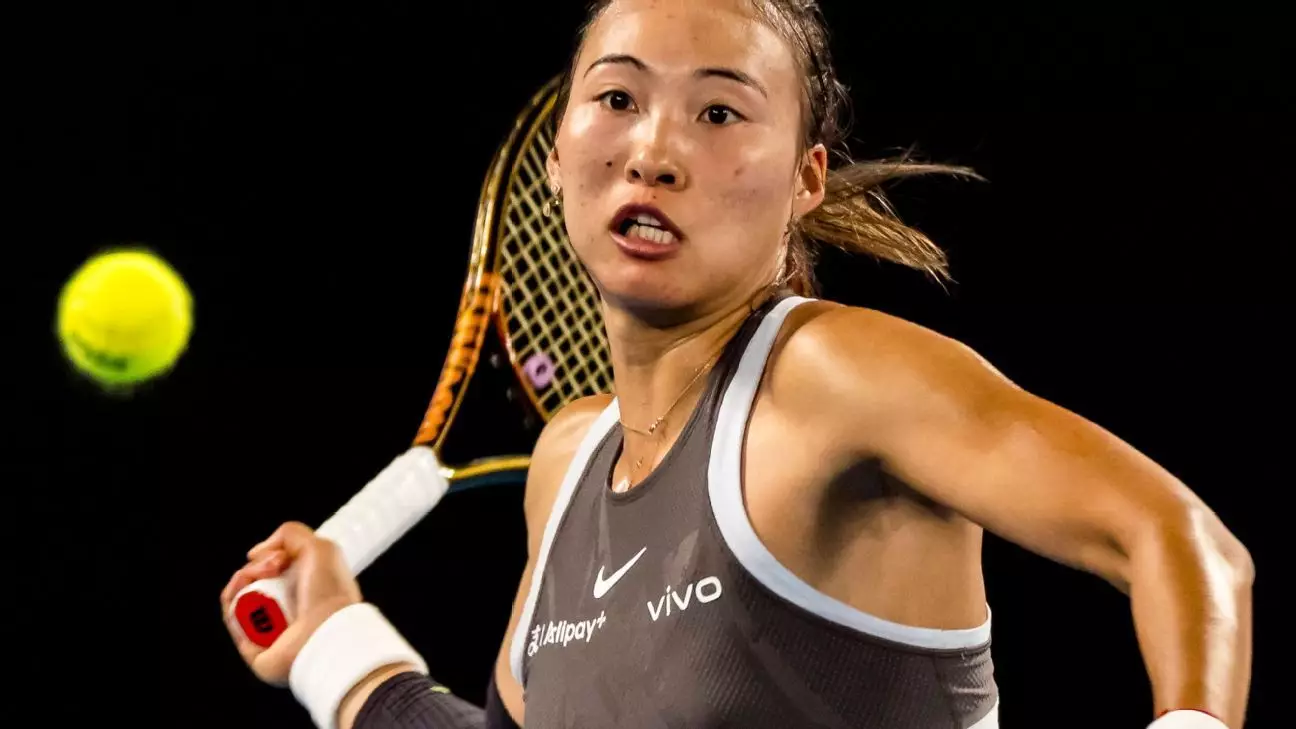Zheng Qinwen’s tennis journey over the course of a year has been nothing short of remarkable. From entering the Australian Open a year prior as a rising talent to returning with newly acquired accolades, including a runner-up finish in Melbourne and an Olympic gold for China, her evolution is notable. In the lead-up to her first match of the 2024 Australian Open against Anca Todoni, Zheng expressed an understandable nervousness. A year ago, she stood on the verge of achieving her first Grand Slam title; now, she returns with that experience, but still feeling the weight of past performances and the expectations that accompany them.
Zheng ultimately conquered her early nerves, defeating Todoni with a score of 7-6 (3), 6-1. This match was emblematic of her status as a competitor who can overcome her apprehensions through sheer talent and determination. “Actually, I feel really nervous,” Zheng admitted, emphasizing that her affinity for the Australian Open only heightened her anxiety. This year, the match not only represented a fresh start but also added pressure to perform on such a grand stage, especially as the world watched.
The environment of the Australian Open has proven to be a potent catalyst for showcasing talent, and Zheng’s experience is a case in point. Last year’s impressive performance, culminating in a showdown against Aryna Sabalenka in the finals, had set high expectations both externally and internally. Entering the 2024 tournament as the No. 5 seed, she faced the paradox of being recognized as a formidable competitor while still grappling with the nerves that often accompany high-stakes matches.
The first round against Todoni revealed a blend of her powerful game and the mental struggles that can arise in crucial moments. Zheng squandered set points while serving—signs of anxiety creeping back into her play—but her ability to regroup and seal the match in straight sets illustrates her growth as an athlete. Acknowledging her nerves, she remarked on how they affected her focus, illustrating the fine line between anxiety and performance.
In the context of the 2024 Australian Open, Zheng wasn’t the only one attempting to find their footing. The tournament opened with significant matches from top-seeded players, including two-time champion Aryna Sabalenka, who initiated her title defense steely with a comfortable win against Sloane Stephens. Similarly, Alexander Zverev, the men’s No. 2 seed, easily advanced against Lucas Pouille, reflecting the readiness of seasoned competitors to seize opportunities.
In contrast, some notable players faced early challenges that disrupted their expectations. The emerging stars of women’s tennis like Linda Noskova and others confronted the pressures of the competition head-on, highlighting the fiercely competitive nature of this year’s draw. Noskova’s exit, one year after her stunning victory over Iga Swiatek, serves as a reminder of the ever-evolving landscape of tennis, where anyone can find themselves up against tough competition.
The tournament’s early rounds also showcased budding talents and history-making moments that captivated audiences. Like Zheng, Hady Habib from Lebanon epitomized determination, becoming the first from his nation to win a match in a Grand Slam singles tournament during the Open era, defeating Bu Yunchaokete. Such moments not only contribute individual narratives to the tournament but also illuminate the broader cultural significance of the event as a platform for diversity and representation in tennis.
Habib’s heartfelt celebration alongside enthusiastic supporters demonstrated that tennis transcends mere statistics and victories; it embodies national pride and a collective journey. “This is probably one of the best days of my career, honestly,” he expressed, underscoring the emotional weight behind athletic achievements.
As Zheng Qinwen embarks on the remainder of the 2024 Australian Open, her evolution as a player will be scrutinized. Whether she can harness the lessons of her journey to power her through a gripping tournament remains to be seen. The new format of the tournament, which spreads matches over a longer period, may serve to her advantage, granting her additional time to shake off any lingering nerves and showcase the caliber of play that defines her game.
Returning to the big stage, Zheng has a unique opportunity not just to grow further as a competitor but to develop resilience in the face of adversity, allowing her to fully embrace the spirit of the Australian Open. As she next prepares to take center stage, spectators and fans alike will be keen to witness how this evolving athlete continues to rise amidst the thrill and unpredictability that defines tennis.

